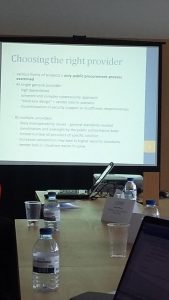Last week I attended the annual conference of BILETA, the British and Irish Legal Education and Technology Association, in the Portuguese city of Braga. The conference was hosted by the Law School at the University of Minho. The campus is full of students in traditional Portuguese academic dress, including tri-corner hat, gown, stockings and ribbons of different colours and widths to denote students’ discipline and year of study, a uniform they wear with pride on certain days of the year.
The themes of the conference were broad, mostly covering current issues in IT and data protection law, with a specific track for Technological Challenges in Legal Education. This track covered a broad range of topics, with presentations from PhD students, academics and researchers addressing themes around technology-enhanced learning in higher education, open access publishing, legal education in developing countries, and citizen science.
Since I was probably the only delegate working in the field of educational technology, the main themes and discourses of the conference were far removed from events I have attended in the past. But the areas of overlap were all the more thought-provoking for this. Although most sessions did not directly address pedagogy, being more focussed on research, it was a common link between nearly all the delegates. The photo below is taken from a presentation on data collection in smart cities, but couldn’t a similar slide feature in a conference paper on data collection in the VLE?
I was able to attend the conference because of some recent work looking at simulation as a teaching technique for law students. Legal educators have been among the foremost proponents of simulation as a teaching technique. Wilson (2010) argues that legal education has made extensive use of simulation since well before the advent of educational technology as we know it today. However, the VLE, video, and other digital technologies have opened up new possibilities. One particularly interesting paper was given by Paul Maharg of the Australian National University College of Law, and colleagues. They presented their customisable, extensible simulation environment which allows lecturers to create characters, scenarios and narratives for use by students to develop practical skills. This sophisticated use of artificial intelligence pointed to one potential future for simulated practice in education.
Overall, one of the main learning points from the BILETA conference for me was the broad range of research interests covered by the general label “law”, and the very obvious links that the discipline, and its practitioners, have with what we might call “real life”. Far from the stereotypical image of elite, privileged lawyers, the conference theme of international perspectives on emerging challenges in law, technology and education was borne out in several fascinating presentations on social media, privacy, data protection, urban planning and many other areas.


